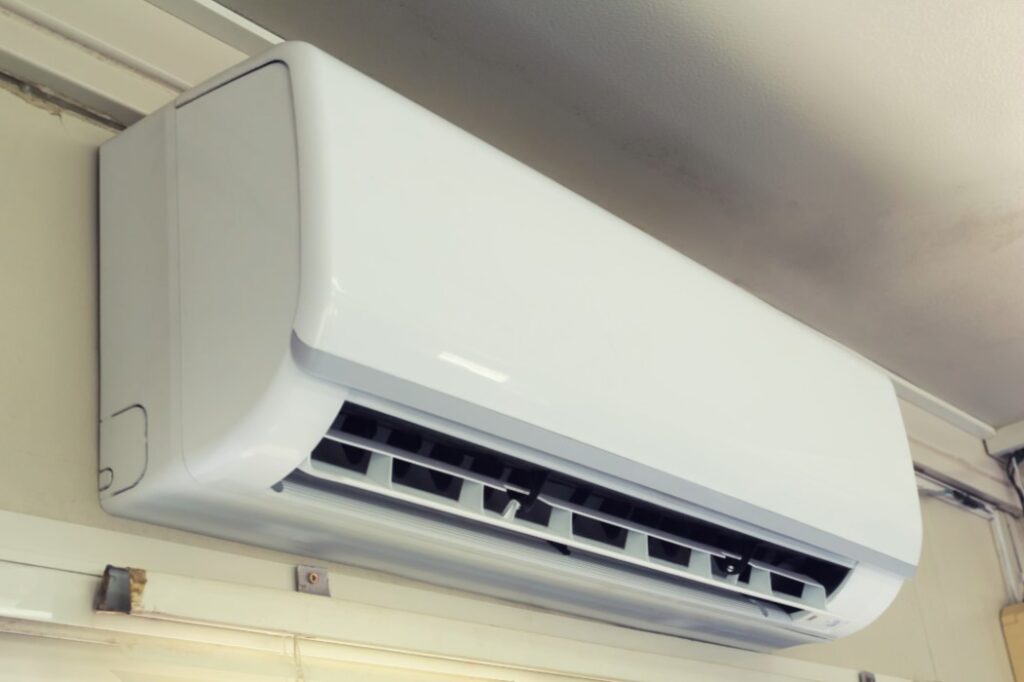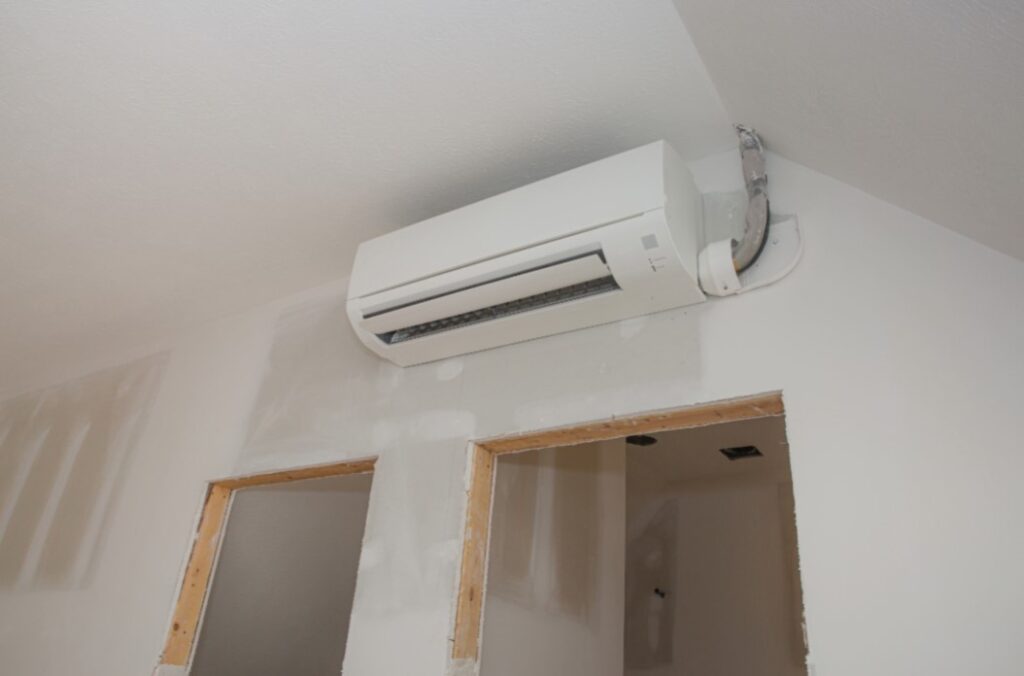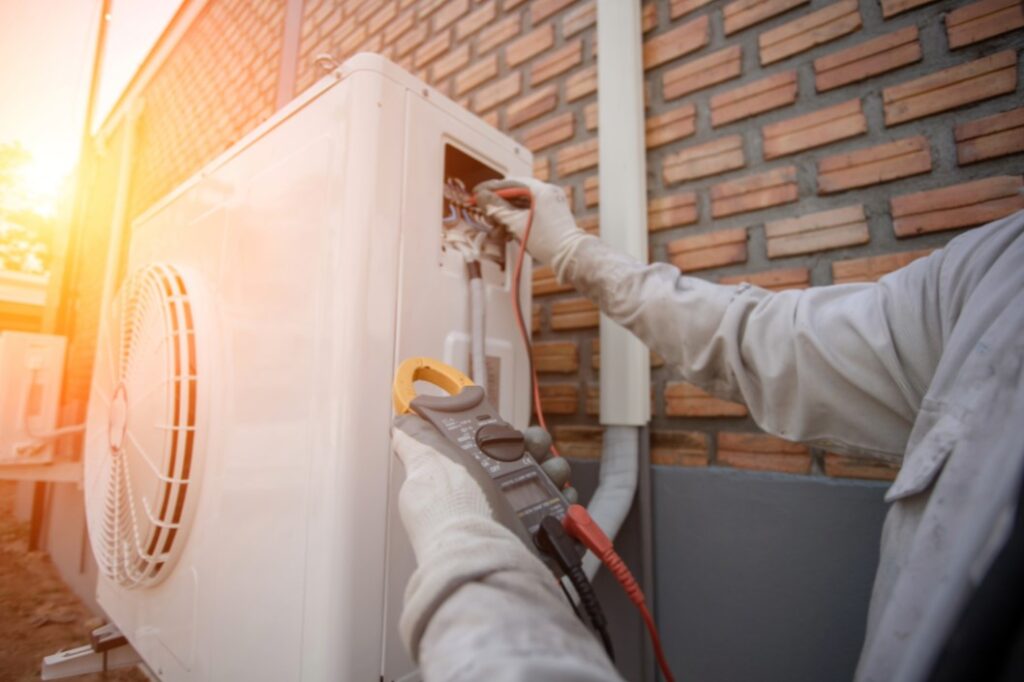
Throughout the countless heating and cooling solutions, one technology that stands out for its innovation and efficiency is ductless heating. Traditional HVAC systems are the standard, but as we strive for better indoor air quality and energy efficiency, new alternatives are emerging. Ductless systems are a game-changer in both residential and commercial settings in New Jersey.
At Beachwood Air, we pride ourselves on staying ahead of the curve, providing state-of-the-art HVAC heating and cooling solutions to our customers in Ocean and Monmouth County.
Whether you’re considering an upgrade to your existing system or starting from scratch, this exploration of ductless heating solutions will provide valuable insights into their benefits and functionality. These are the future of efficient, cost-effective, and quality-controlled heating and cooling.
Understanding Ductless Heating Systems
What are Ductless Heating Systems?
Ductless heating systems, ductless mini-splits or even ductless heat pumps, represent a modern and innovative approach to regulating temperature. These systems provide an energy-efficient alternative to traditional HVAC systems, functioning without the necessity for extensive ductwork, thus making them an ideal choice for homes or buildings where the installation of ducts may not be feasible or wanted.
A ductless system operates by employing individual indoor units installed in specific rooms or zones within a building. Each unit is connected to an outdoor component through a small conduit. This arrangement allows for precise temperature control in each zone, reducing energy waste and ensuring a more comfortable environment.
How Do Ductless Heating Systems Work?
The working mechanism of these ductless heating systems is simple and effective. During New Jersey’s cold winter months, the outdoor unit extracts heat from the external air and transfers it indoors. But during warmer periods, the system operates in reverse, removing heat from inside your home and expelling it outdoors. This dual functionality serves as both a heating and cooling system.
Mini splits, also sometimes referred to as ductless mini split air conditioners or heat pumps, run on electricity alone. This sets them apart from other furnaces or air conditioning units. Mini split units don’t use any fossil fuel, natural gas, propane, or oil. Rather than burning fuel to generate heat, a mini-split system uses electricity to move heat, similar to the way a refrigerator works, which requires less energy than generating heat directly.
The Role of Advanced Filtration Systems in Ductless Systems
One of the significant advantages of ductless systems is their advanced filtration systems. Traditional HVAC systems can circulate dust, allergens, and other pathogens throughout your New Jersey home via the ductwork. Ductless heat pumps incorporate multi-stage filtration systems within each indoor unit. This reduces the level of dust, bacteria, pollen, allergens, and other particulates in the air significantly. And since the air isn’t traveling through a duct to get condition the space, there’s no chance of it bringing any uninvited allergens or pollutants. This feature greatly enhances indoor air quality, making your living spaces healthier and more comfortable.
Ductless heating systems offer an energy-efficient, flexible, and health-conscious solution for your heating and cooling needs. Understanding how these systems work can help you make an informed decision on whether this technology is the right fit for your home or business.
Types of Ductless Heating Systems
Ductless heating systems have revolutionized the HVAC industry by providing efficient and flexible heating and cooling solutions. There are three main types: Mini-split systems, Multi-split systems, and Variable Refrigerant Flow (VRF) systems.
Mini-Split Systems
Ductless mini-split systems are perhaps the most commonly known type of ductless system. As the name suggests, these systems consist of a singular outdoor unit connected to an indoor unit. The heat pump in the outdoor unit is responsible for either extracting or expelling heat, depending on whether the system is set to cool or heat the space.
This type of system is ideal for single-room applications, like a home office, garage, or extension. The absence of ductwork contributes to improved indoor air quality as there’s less opportunity for dust and allergens to circulate. Mini-split systems are celebrated for their energy efficiency, as you only heat or cool the rooms you’re using.

Split system air conditioners use electricity to generate thermal heat while gas heaters burn gas to produce heat. Some small 9k – 12k BTU systems may require a 110-volt service, but most will require 220 volts or more. Since these systems need to be hardwired into the electrical service panel, be sure the breaker panel is properly sized and can handle the additional voltage.
Multi-Split Systems
Multi-split systems work similarly to mini-split systems, but they connect multiple indoor units to a single outdoor unit. This allows for individualized control of the temperature in different rooms or zones within a building, making it an excellent solution for larger homes or small businesses.
Like the mini-split system, the multi-split also uses a heat pump to transfer heat between the outdoor and indoor units. However, the added complexity requires more careful planning and installation to ensure optimal performance and energy efficiency.
Variable Refrigerant Flow (VRF) Systems
Variable Refrigerant Flow (VRF) systems are the most advanced and versatile of the ductless systems. They can simultaneously heat and cool different areas within a building by controlling the amount of refrigerant flowing to each indoor unit.
VRF systems are incredibly energy-efficient and provide exceptional comfort due to their ability to precisely match the cooling or heating output to the current conditions and demands of each zone. While they are typically used in commercial applications due to their complexity and cost, they can also be a viable option for large residential properties.
Installation and Maintenance of Ductless Heating Systems
When it comes to heating and cooling solutions, ductless systems are becoming increasingly popular due to their efficiency, flexibility, and ease of installation. As an HVAC service provider, Beachwood Air has extensive experience installing and maintaining these systems for residential and commercial customers in Ocean and Monmouth County. Here’s an overview of the process and some tips for maintaining your ductless system.
The Installation Process
The installation of a ductless heating and cooling system in New Jersey is less disruptive compared to traditional HVAC systems. The process begins with a detailed assessment of your property to determine the best locations for the indoor and outdoor units. This includes considering factors like room size, sun exposure, and insulation.
Once the optimal locations have been identified, Beachwood Air will mount the indoor units on the wall and install the outdoor unit at a suitable location outside your New Jersey home or business. The two are then connected using a small conduit that runs through a hole in the wall. This setup allows for efficient heat transfer and eliminates the need for extensive ductwork.
The entire installation process is typically completed within a day, minimizing disruption to your daily activities. At Beachwood Air, we prioritize your satisfaction and ensure prompt and reliable installation services.
Tips for Maintaining Your Ductless Heating System
Proper maintenance is key to ensuring the longevity and efficiency of your ductless HVAC system. Here are some tips to keep your system running smoothly:
- Regular Cleaning: Clean the filters in the indoor units regularly. This not only improves indoor air quality but also enhances the system’s efficiency.
- Annual Check-up: Schedule an annual maintenance check with Beachwood Air. We will inspect the system thoroughly, including the outdoor unit, to ensure everything is working correctly.
- Prompt Repairs: If you notice any issues, such as unusual noises, reduced efficiency, or inconsistent temperatures, contact us immediately. Delaying repairs can lead to more significant problems down the line.
- Proper Use: Avoid overworking your system. Use it judiciously and in accordance with the manufacturer’s guidelines.

At Beachwood Air, we offer comprehensive heating maintenance services to keep your ductless heating and cooling system in top shape. We believe in prompt, reliable, and affordable solutions, ensuring that your comfort is never compromised.
Embracing the Future with New Jersey Ductless Heating Systems
Ductless heating systems represent the next step in the evolution of HVAC technology, combining efficiency, cost-effectiveness, and tailored comfort. Whether you opt for a mini-split, multi-split, or a VRF system, you’re investing in a future-oriented solution that responds to your unique heating and cooling needs.
Beachwood Air remains committed to guiding you through every step of the installation and maintenance process, ensuring a seamless transition to a more sustainable and comfortable living or working environment. Embrace the change with ductless systems and enjoy the benefits that come with these innovative heating and cooling solutions.
